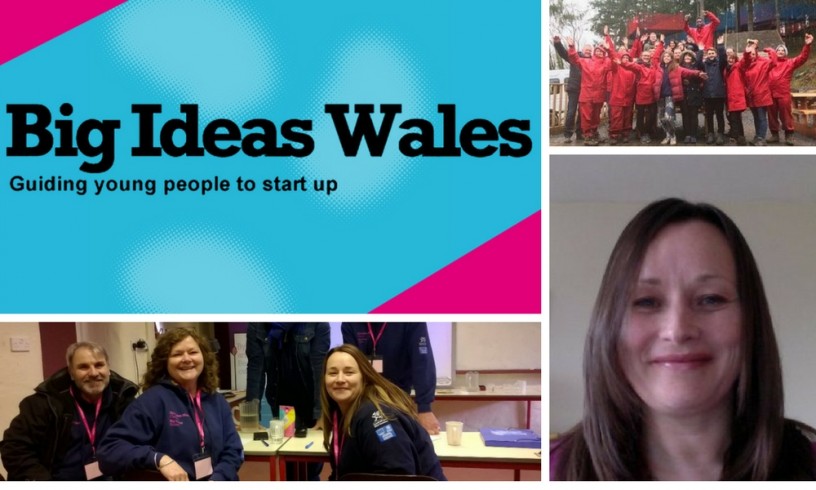In the spotlight:
Name: Penny Matthews
Location: Wales
Occupation: Partnership Manager, Entrepreneurship Exchange, Big Ideas Wales Lecturer, Business, Innovation and Growth, Grwp Llandrillo Menai
You are an influential individual within the enterprise education space. What does ‘enterprise education’ mean to you, and why do you think it’s important?
Enterprise education means a great deal to me! Everyone has the ability to be enterprising -regardless of academic achievement or social demographic – but without enterprise education how do we enable young people to harness their potential? Enterprise education embraces and celebrates whole person development – it is not about business start-up or new venture creation. The terminology of enterprise and entrepreneurship are communally pulled together and misunderstood.
Being enterprising is all about the individual becoming resilient, learning from failure, seeking opportunities, working as a team, creatively solving problems, taking the initative, mobilising others, coping with uncertainty, being motivated, learning to be empathetic and never giving up.
We want our young people to be ready for the global world they will be entering and to have enterprising skills that will prepare them to actively contribute.
How did you first become involved with enterprise education?
I was interviewing for a teaching position and was offered the role as an enterprise coordinator based on my previous experiences of self-employment (I started my own business whilst still in education). I have never looked back: I am very passionate about enterprise, entrepreneurship and innovative education!
How has enterprise education changed over the years, and how does it benefit students today?
It has rapidly changed over the last 15 years. Enterprise education now has an identity and a meaning. It is often drawn into the employability agenda – when we refer to a young person being employable we also mean they need to be enterprising. We want intrapreneurs as well as entrepreneurs.
In Wales, the Welsh Baccalaureate sees the embedment of enterprise and employability as a core unit which will become compulsory for all young people over the age of 16 from September 2017. The Donaldson review also identifies enterprise and creativity as one of the four pillars of educational reform in Wales.
Benefits to the students vary depending on location; who is delivering; what educators perceive enterprise education to entail; and how this is delivered. It has huge benefit to the young person: they have the opportunity to put learning into action and develop a wide range of transferrable enterprising skills to prepare them for becoming happy, motivated, resilient and creative global citizens.
You have been championing the development of a first-class entrepreneurial ecosystem across Wales. Tell us a little more about your work.
All very exciting! In essence the work I do is about enabling greater connectivity across the youth entrepreneurship landscape. Great work is being undertaken across key stakeholder groups; we want to ensure we foster conditions to cultivate connectivity and establish a youth entrepreneurship ecosystem in Wales.
You previously commented that ‘young entrepreneurs need networks that are relevant to them, and support from existing entrepreneurs who can challenge them and give them the benefit of their experience to start a successful business.’ How can the business community and educators work together to support budding entrepreneurs?
There are many examples of business communities and educators already working together to support budding entrepreneurs in a variety of ways (e.g. bootcamps, pitches, mentoring, inspiring talks, etc.). We do need to improve visibility for young people to enable them to engage with the support/networks at various stages of their journey.
There’s an age-old debate about whether entrepreneurs are born or made. Can you weigh into this?
This is a question that is yet to be fully answered! There are many arguments surrounding this debate. In my opinion, entrepreneurs are both born and can be made: the key driving factor which links them is passion and love. If you are passionate about an idea and love the area you are working/ learning in, your natural instincts develop – which sparks entrepreneurial tendencies and the learning is wanted. You can lead a horse to water but you can’t make it drink…
For students who don’t want to be entrepreneurs, what other benefits does enterprise education provide?
The benefits are endless! Students will develop a wide portfolio of skills and abilities needed for all areas in life, both personally and professionally. We want all young people to be prepared for entering a global community, to be creative, self-starters, resilient, have the ability to learn from failure, be positive, determined, have emotional intelligence, be happy, healthy, seek opportunities and play their part in whatever path they may choose. Enterprise education is not about starting a business, it is about engaging, empowering and equipping young people with transferable skills which can be utilised and built on throughout their life. Enterprise education provides the basis for these young people to develop their own unique “can do” toolkit to better respond to challenges and opportunities they will face in work and life.
What does a typical day look like in the world of Penny Matthews?
Very varied, spinning lots of plates! I could be in North Wales in the morning, South Wales in the evening and undertaking international work the next day. Alongside my role in Big Ideas Wales I also continue to teach. I am undertaking academic research in youth entrepreneurship ecosystems and live in a boarding school – this means each day is never the same. I love what I do and am very privileged to work with the most amazing individuals/ young people. My typical day always includes a bar of chocolate and several cups of coffee, usually starting at 8am and finishing in the evening, except Fridays: I always finish at 5pm on a Friday if I can!
And finally, Penny, tell us: if you were an animal, what would you be and why?
I want to say a dragon, because sometimes I feel as an enterprise educator I am a mythical creature who is brave and fearless – although I do not breathe fire! My Chinese star sign is Rabbit (full of beans, social, determined, kind, part of a big team). My house is always full of people with several things going on at the same time: never a dull moment but I wouldn’t have it any other way!





Leave a Reply